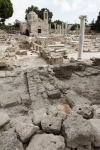Welcome to this series of posts giving a survey of what the early church fathers have written about justification and works of law with reference to Paul. Click this link to go to the first post with the contents of the whole.
In today’s post we look at Clement of Alexandria (c.e. 150-215). He is not the same Clement who is of Rome and a probably a coworker of Paul’s. He quotes several statements Romans concerning justification and faith.
Gentiles included in the covenant
Wherefore we believe Him in whom we have confidence unto divine glory and salvation. And we confide in Him, who is God alone, whom we know, that those things nobly promised to us, and for this end benevolently created and bestowed by Him on us, will not fail.
Benevolence is the wishing of good things to another for his sake. For He needs nothing; and the beneficence and benignity which flow from the Lord terminate in us, being divine benevolence, and benevolence resulting in beneficence.
And if to Abraham on his believing it was counted for RIGHTEOUSNESS (Gen 15.6; Rom 4.3);
and if we [Gentile Christians] are the seed of Abraham, then we must also believe through hearing. For we are Israelites, who are convinced not by signs, but by hearing. Wherefore it is said,
“Rejoice, O barren, that barest not; break forth and cry, thou that didst not travail with child: for more are the children of the desolate than of her who hath an husband.” (Is 54.1)
“Thou hast lived for the fence of the people, thy children were blessed in the tents of their fathers.”
And if the same mansions are promised by prophecy to us and to the patriarchs, the God of both the covenants is shown to be one. Accordingly it is added more clearly,
“Thou hast inherited the COVENANT of Israel,”
speaking to those called from among the nations, that were once barren, being formerly destitute of this husband, who is the Word,—desolate formerly,—of the bridegroom.
“Now the JUST shall live by faith,” (cf. Rom 1.17; Hab 2.4)
which is according to the COVENANT and the commandments; since these, which are two in name and time, given in accordance with the [divine] economy—being in power one—the old and the new, are dispensed through the Son by one God.
As the apostle also says in the Epistle to the Romans,
“For therein is the RIGHTEOUSNESS of God revealed from faith to faith,” (Rom 1.17)
teaching the one salvation which from prophecy to the Gospel is perfected by one and the same Lord.
(Clement of Alexandria. (1885). The Stromata, or Miscellanies. In A. Roberts, J. Donaldson, & A. C. Coxe (Eds.), Fathers of the Second Century: Hermas, Tatian, Athenagoras, Theophilus, and Clement of Alexandria (Entire) (Vol. 2, pp. 353–354). Buffalo, NY: Christian Literature Company.)
The Genesis 15.6 allusion is associated with Gentile Christians and the covenant normally associated with Israel.
Growth and Perfection attributed to Faith
If we skip a bit forward in the same letter he quotes again from Romans and speaks about faith. This time in more general terms.
For, in fine, the agreement and harmony of the faith of both contribute to one end—salvation. We have in the apostle an unerring witness:
“For I desire to see you, that I may impart unto you some spiritual gift, in order that ye may be strengthened; that is, that I may be comforted in you, by the mutual faith of you and me.” (Rom 1.11-12)
And further on again he adds,
“The RIGHTEOUSNESS of God is revealed from faith to faith.” (Rom 1.17)
The apostle, then, manifestly announces a twofold faith, or rather one which admits of growth and perfection; for the common faith lies beneath as a foundation. To those, therefore, who desire to be healed, and are moved by faith, He added,
“Thy faith hath saved thee.” (Mt 9.22)
But that which is excellently built upon is consummated in the believer, and is again perfected by the faith which results from instruction and the word, in order to the performance of the commandments. Such were the apostles, in whose case it is said that
“faith moved mountains and transplanted trees.” (Mt 17.20; Lk 17.6; 1 Cor 13.2)
Whence, perceiving the greatness of its power, they asked
“that faith might be added to them; ” (Lk 17.5)
a faith which salutarily bites the soil “like a grain of mustard,”and grows magnificently in it, to such a degree that the reasons of things sublime rest on it.
For if one by nature knows God, as Basilides thinks, who calls intelligence of a superior order at once faith and kingship, and a creation worthy of the essence of the Creator; and explains that near Him exists not power, but essence and nature and substance; and says that faith is not the rational assent of the soul exercising free-will, but an undefined beauty, belonging immediately to the creature;—the precepts both of the Old and of the New Testament are, then, superfluous,
if one is saved by nature, as Valentinus would have it, and is a believer and an elect man by nature, as Basilides thinks; and nature would have been able, one time or other, to have shone forth, apart from the Saviour’s appearance.
But were they to say that the visit of the Saviour was necessary, then the properties of nature are gone from them, the elect being saved by instruction, and purification, and the doing of good works.
Abraham, accordingly, who through hearing believed the voice, which promised under the oak in Mamre,
“I will give this land to thee, and to thy seed,”
was either elect or not. But if he was not, how did he straightway believe, as it were naturally? And if he was elect, their hypothesis is done away with, inasmuch as even previous to the coming of the Lord an election was found, and that saved:
“For it was reckoned to him for RIGHTEOUSNESS.” (Gen 15.6; Rom 4.3)
(Clement of Alexandria. (1885). The Stromata, or Miscellanies. In A. Roberts, J. Donaldson, & A. C. Coxe (Eds.), Fathers of the Second Century: Hermas, Tatian, Athenagoras, Theophilus, and Clement of Alexandria (Entire) (Vol. 2, pp. 444–445). Buffalo, NY: Christian Literature Company.)
Clement is speaking about faith in general. He seems to be associating it with nature, election, instructions, good works and salvation.
In the next post we look at Tertullian (c.e. 155-240). Tertullian was a prolific early Christian author from Carthage in the Roman province of Africa. He is the first Christian author to produce an extensive corpus of Latin Christian literature. He also was a notable early Christian apologist and a polemicist against heresy. He wrote several statements concerning justification.
Copyright © Joshua Washington and thescripturesays, 2015. All Rights Reserved.



